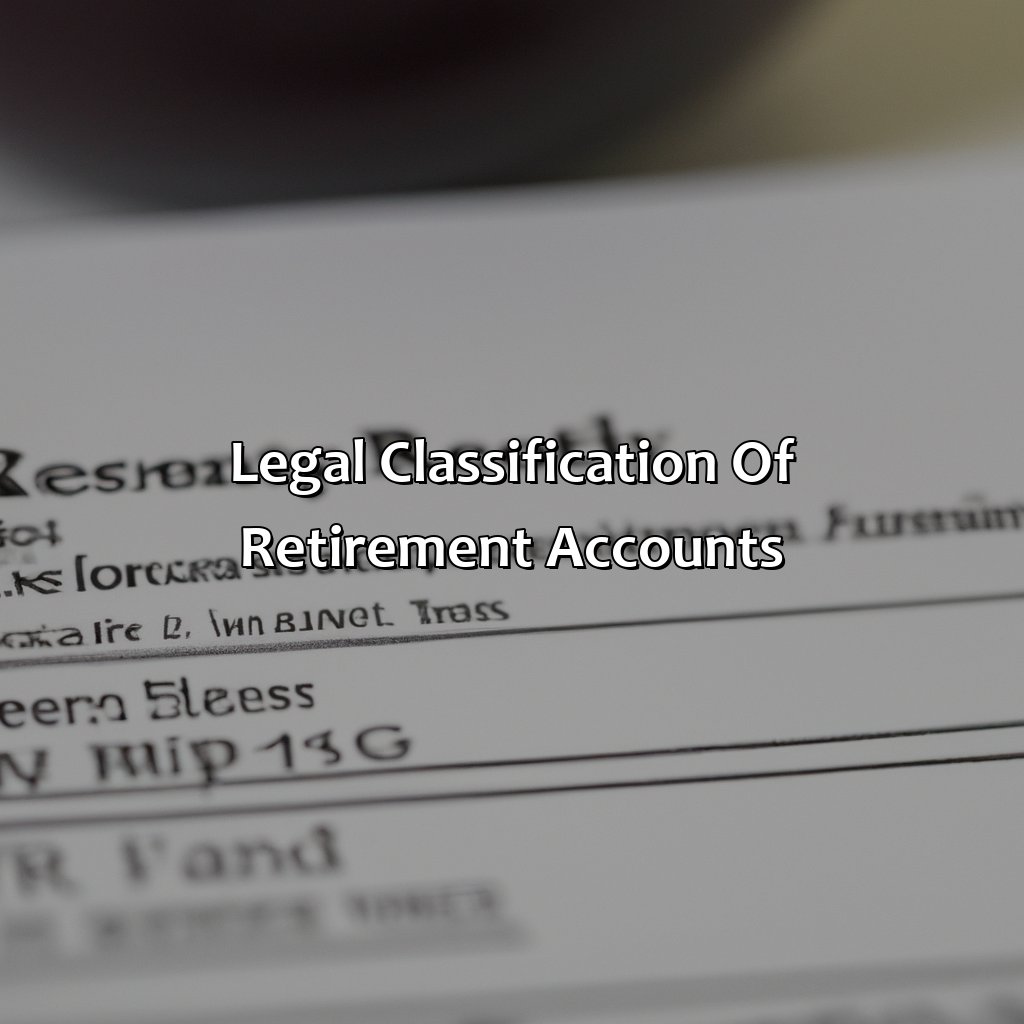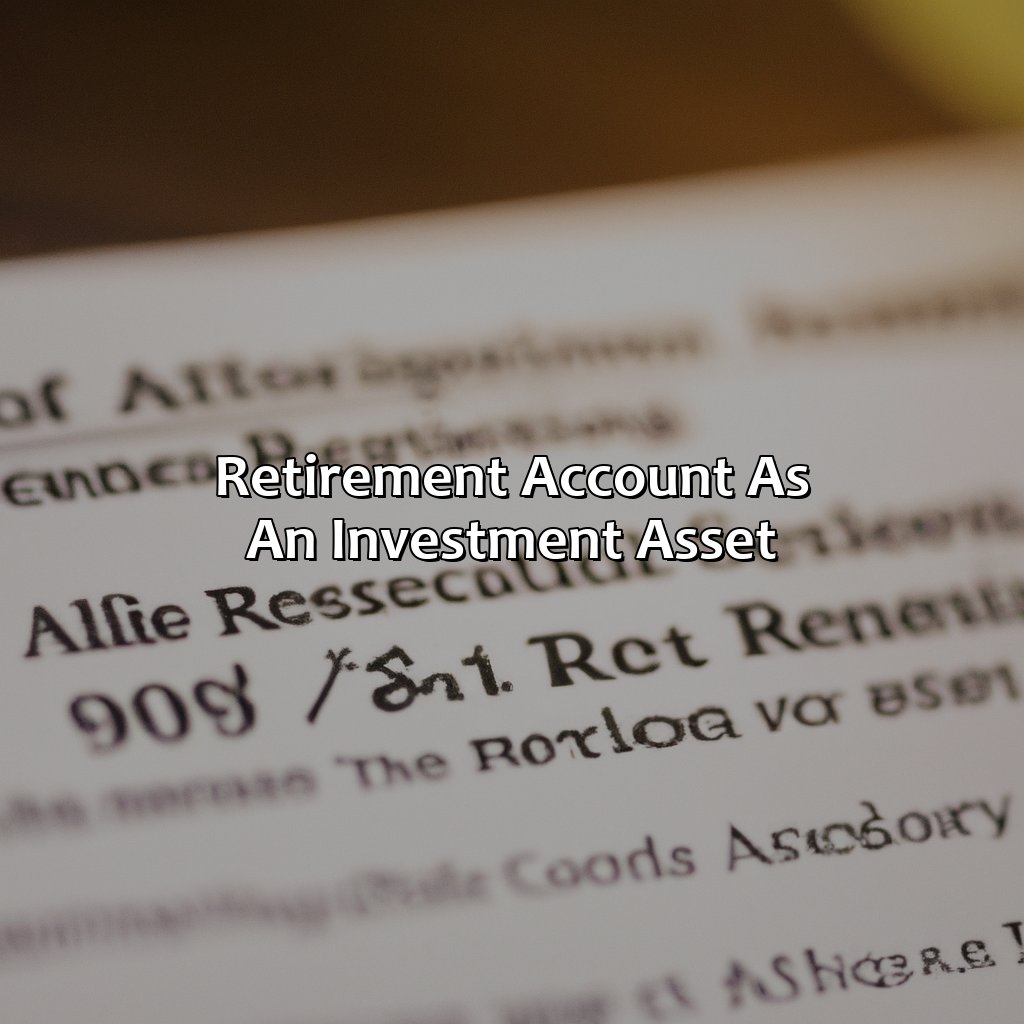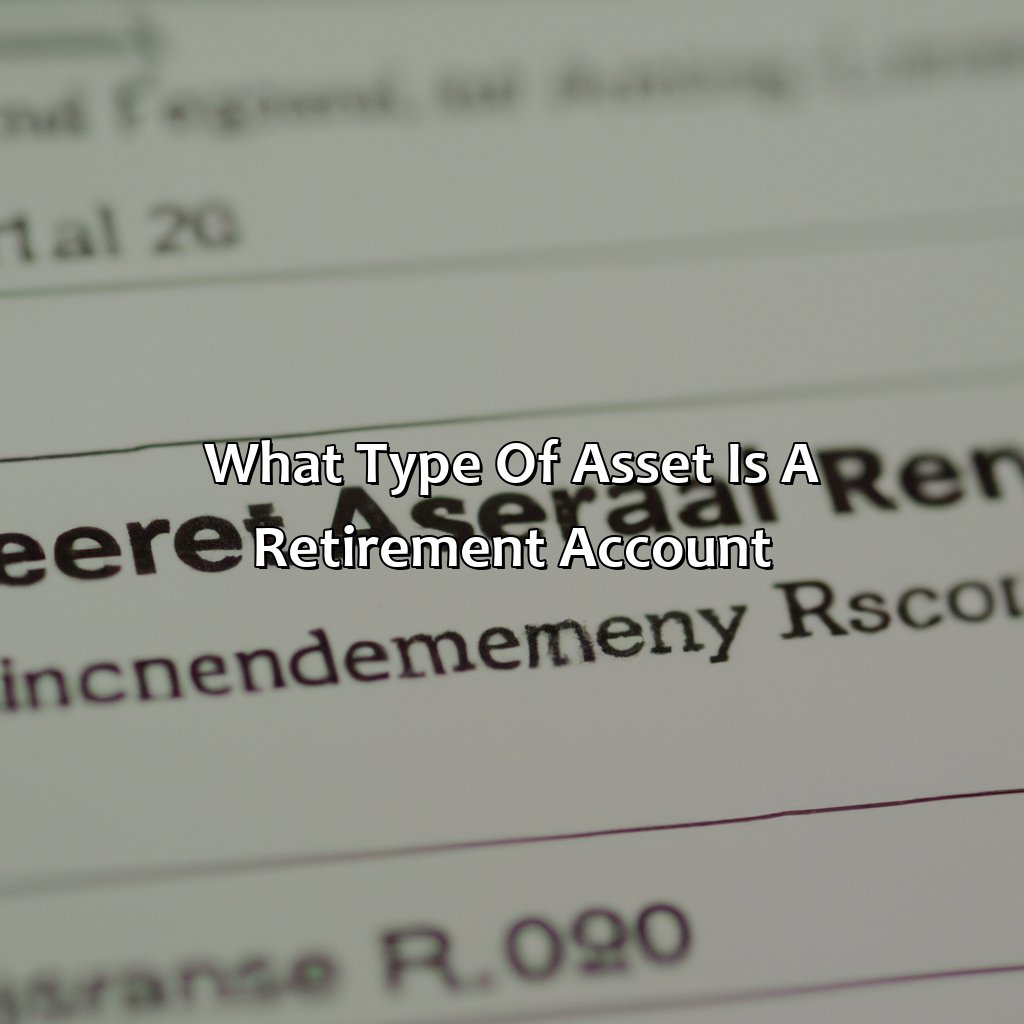What Type Of Asset Is A Retirement Account?
Key Takeaway:
- A retirement account is an investment asset designed to provide income in retirement.
- Retirement accounts are legally classified as tax-deferred or tax-exempt accounts, depending on their tax treatment.
- Investments within retirement accounts can include stocks, bonds, mutual funds, and other assets, with advantages and disadvantages to consider when deciding how to invest.
Are you confused about the assets you own? Worry no more! This article will provide you with a comprehensive guide on retirement accounts, so you can make informed decisions on your finances.
What is a Retirement Account?
A retirement account refers to a type of investment account that individuals use to put aside funds for their retirement. It is a financial savings vehicle designed to provide future income, whether through an employer-sponsored plan or an individual account. Retirement accounts are typically tax-deductible, tax-deferred, or tax-free. They can be invested in stocks, bonds, mutual funds, or other types of investments, and there are numerous types of retirement accounts available, such as traditional IRA, Roth IRA, 401(k), and pension plans.
When planning for retirement, it is important to understand the type of asset a retirement account is. A retirement account is an investment vehicle that holds a portfolio of assets and accumulates savings to provide income in retirement. The account size and income it provides will depend on the performance of the assets it holds. It is crucial to invest strategically in line with one’s risk tolerance and investment goals.
One important consideration is the tax implications of a retirement account. Contributions to a traditional IRA and 401(k) are tax-deductible, but withdrawals are taxed as income. Roth IRA contributions are made with after-tax dollars, but withdrawals are tax-free. For 401(k)s, some employers offer a matching contribution, making it an attractive investment option.
Pro Tip: Regularly reviewing and adjusting the investment strategy for retirement accounts is crucial to maximize investment returns. Consult with a financial advisor to understand the optimal investment option for your retirement account.

Image credits: retiregenz.com by James Woodhock
Legal Classification of Retirement Accounts
To comprehend the legal segmentation of retirement accounts with tax-deferred and tax-exempt subsections as the answer, it’s essential to identify the subtleties of how these accounts are handled under the law.
In this part, we analyze the consequences of tax-deferred retirement accounts, and also the advantages of tax-exempt retirement accounts.

Image credits: retiregenz.com by Joel Arnold
Tax-Deferred Retirement Accounts
Retirement accounts that sustain taxes until withdrawal are a type of asset that defers tax. As the name suggests, these assets postpone income taxation retirement accounts effectively delaying the payment of taxes on funds contributed and earned within them. When such accounts generate revenue through growth or interests, it remains untaxed when inside any form of retirement account. The most common examples are advised by financial institutions to accumulate funding for retirement, like 401(k), IRA, Roth IRA, and others.
Investing in Tax-Deferred Retirement Accounts is beneficial since people can grow their wealth before starting the draw-down phase after retirement while putting off tax claims from accumulating over time. There are also perks to employers who provide tax-deferred packages for their employees within legal limits.
These accounts are primarily used for emergencies while avoiding heavy penalties and fines with early withdrawals. It’s best to have a long-term over short-term outlook since compounded interest works better over time with tax delays than without. Many strategies exist in maximizing retirement planning like minimizing taxable income sources or spreading withdrawals over years rather than lump sums at once.
These strategies ensure one does not lose significant state or federal deductions if they cease working during states that impose an income tax.
You don’t have to be rich to have a tax-exempt retirement account, but it sure helps if you want to retire on a yacht.
Tax-Exempt Retirement Accounts
Retirement accounts that are exempt from taxation are a valuable asset for individuals who want to save for their post-working life. These tax-exempt retirement accounts offer various benefits such as tax-deferral and contribution limits. They may encompass individual retirement accounts, employer-sponsored plans, or pension schemes.
Additionally, some employers may even match employee’s contributions to the plan, giving employees more incentive to fund their retirement through such plans. The funds in these accounts accumulate over time through investments made by the account holder and can be withdrawn penalty-free once the individual reaches a certain age.
It is important to consult with a financial advisor or tax professional regarding the rules and regulations surrounding these types of accounts since they change frequently based on new legislation and proposals. Failure to understand these policies could result in inadvertently violating applicable rules and penalties.
Take advantage of available resources when making decisions related to retirement savings in order not to miss out on the long-term benefits these accounts provide. Retirement accounts are a valuable tool for diversifying your investment portfolio with a little bit of tax saving which never hurts.
Retirement Account as an Investment Asset
To grasp retirement accounts as an investment, delve into two main parts:
- Types of investments within retirement accounts
- Pros/cons of investing in them
By the end, you will be knowledgeable to make wise decisions about retirement account investments.

Image credits: retiregenz.com by Joel Jones
Types of Investments within Retirement Accounts
Retirement accounts are a popular investment asset. There are numerous types of investments within these retirement accounts that one can explore to ensure a successful financial future.
- Stocks
- Bonds
- Mutual Funds
- Exchange-Traded Funds (ETFs)
- Real Estate Investment Trusts (REITs)
One can invest in stocks, bonds, mutual funds, ETFs and REITs within their retirement account. Each investment option carries its own set of risks and potential gains, which should be carefully studied to make an informed decision.
Researching the different types of investments within retirement accounts is crucial for making sound financial decisions. It enables one to maximize their returns while minimizing potential risks associated with the investment options.
With an informed decision-making process aided by professional advice and thorough research, Mr. John decided to diversify his retirement account with mutual funds. This decision ultimately contributed towards his happy and financially secure retirement years.
Retirement accounts may be a wise investment, but remember, you can’t spend your golden years in a 401(k) beach house.
Advantages and Disadvantages of Investing in Retirement Accounts
Investing in a Retirement Account: Advantages and Disadvantages
Retirement accounts are valuable investment assets that come with distinct advantages and disadvantages for investors. Here are some of the pros and cons:
Advantages:
- Tax benefits – Contributions made to retirement accounts offer tax savings, including a reduction in taxable income and deferred taxes on contributions.
- Long-term saving – Investing in a retirement account allows you to save money for future use, specifically during your retirement years.
- Employer match – Companies typically offer an employer-matching program to enhance their employees’ retirement savings plan effectively.
- Diverse investment options- Different retirement accounts allow various types of investments such as stock, bonds, mutual funds, among others.
Disadvantages:
- Limitations on withdrawals before the age of 59 1/2 can result in penalties or additional taxes.
- No guarantee of long-term financial stability – there’s no way to predict how much money you’ll have by the time you reach your retirement years due to inflation factors beyond control at times.
- A lower rate of return on investment is possible compared to other securities.
- A possibility of losing money in poor market conditions should be considered as well.
It’s important to assess your personal situation carefully when considering whether investing in a Retirement account is right for you. Furthermore, consider consulting an experienced financial advisor who will guide you competently.
Pro Tip: Understanding the current tax laws and regulations regarding Retirement Accounts can help investors achieve maximum tax benefits while using it as part of their investment portfolio strategy.
Five Facts About Retirement Accounts:
- ✅ A retirement account is a type of investment account designed to help individuals save for retirement. (Source: Investopedia)
- ✅ There are two main types of retirement accounts: traditional and Roth. (Source: Fidelity)
- ✅ Contributions to traditional retirement accounts may be tax-deductible, while contributions to Roth retirement accounts are made with after-tax dollars. (Source: NerdWallet)
- ✅ Retirement accounts often offer tax advantages, such as tax-deferred growth. (Source: Forbes)
- ✅ There are penalties for early withdrawal from a retirement account. (Source: CNBC)
FAQs about What Type Of Asset Is A Retirement Account?
What type of asset is a retirement account?
A retirement account is a type of investment asset that helps you save money for your retirement. It is usually a tax-advantaged account that allows you to invest in different types of assets, such as stocks, bonds, mutual funds, and exchange-traded funds (ETFs).
What are the different types of retirement accounts?
There are several types of retirement accounts, including Individual Retirement Accounts (IRAs), 401(k) plans, Roth IRAs, Simplified Employee Pension (SEP) plans, and Simple IRA plans.
Are retirement accounts considered liquid assets?
Retirement accounts are generally not considered liquid assets because they come with restrictions on when and how much you can withdraw without penalties. However, in some cases, you may be able to borrow against your retirement account or take a hardship withdrawal.
Can retirement accounts lose value?
Yes, retirement accounts can lose value if the investments held within them perform poorly. It’s important to keep in mind that retirement accounts are long-term investments and should be diversified to help minimize risk.
Can I transfer my retirement account from one company to another?
Yes, you can transfer your retirement account from one company to another without penalty if you follow the proper procedures. This is called a rollover and can be done between different types of retirement accounts, such as from a 401(k) to an IRA.
What happens to my retirement account if I change jobs?
If you change jobs, you have several options for what to do with your retirement account. You can leave it with your previous employer’s plan, roll it over to your new employer’s plan or an IRA, or cash it out (which may result in taxes and penalties).






